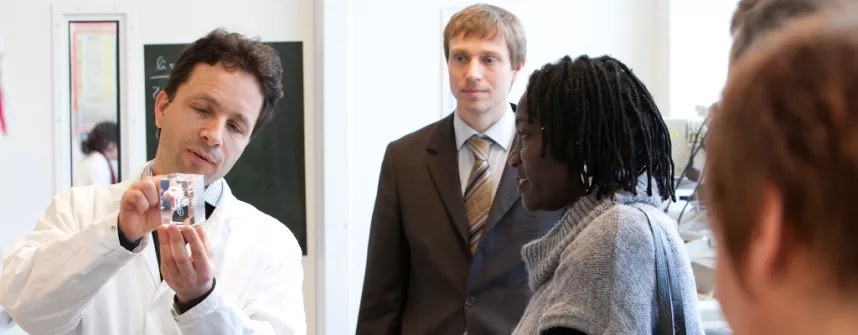On the way to custom-tailored medication
April 18, 2017
When our body gets sick, our natural immune system responds. Sometimes, however, a disease disables this system and spreads. So it would be good, if our immune system could be re-started in an individually targeted manner. Researchers at Bremen’s Jacobs University have developed a method that standardizes the necessary preliminary analyses for personal drugs and can thus accelerate their production to an unexpected degree. Two pharmaceutical companies are now using the method for the first time as a test.
When a cell gets sick, a sophisticated disease reporting process is triggered: In the cell, a protein component that is characteristic for the respective disease binds to a carrier molecule, a so-called MHC-Class-I protein. It takes the protein “piggyback” and carries it out of the cell and onto its surface. There, based on the protein freight, the T-cells of the body’s immune system detect that the cell is diseased – and destroy it. In cancerous tumors or viral infections, however, various mechanisms spring into action to disable this protective system. Some tumors, for instance, excrete certain hormones that distract the T-cells from their task: They “forget” to destroy diseased cells. One idea to reverse this process is so-called immunotherapy. It uses drugs to achieve a targeted re-invigoration of the patient’s personal immune response.
For such custom-tailored pharmacology, it is first necessary to examine exactly how the defending immune cells of a particular patient react to the status information “cancer” or “virus”: To do so, it is necessary to reproduce the natural disease reporting process artificially in a test tube. A research group under the biochemist and cell biologist Sebastian Springer of Jacobs University in Bremen has developed a method to do just that.
Springer describes the basic questions of his research as follows: To ensure that everything in the lab works the way it does in our body – messenger protein, carrier molecule, detection and containment of the disease – “it is important to know when and under what conditions which component is where on the cell and how the transport from inside to out takes place.” For instance, his team discovered that the MHC-Class-I molecule goes through a number of temporary precursor forms before reaching a stable form. Only then is it possible for the messenger protein to dock. In this stable form, another chemical component occupies the position at which a messenger protein otherwise docks. It is precisely this MHC-Class-I molecule with a placeholder for any given messenger protein that the Bremen group can create artificially. So far, their leader, Springer, holds the only patent in the world for it. A great leap forward for medicinal research, because it can be used to study the immune response of individual patients to any conceivable disease.
Currently, about 10,000 MHC-Class-I carrier molecules are known. Some occur only rarely. But some are active in up to 30 per cent of all people. Clinical research will start with them. “In our lab, we cannot invent any revolutionary therapy. But we can create the prerequisites, so that the right people can succeed in doing so,” says Springer.
Two pharmaceutical companies are now using his patent for the first time. In addition, one company has purchased ten micrograms of the finished MHC-Class-I precursor forms. That is less than the weight of a human egg cell. Nevertheless, it currently takes about six weeks and costs about 15,000 Euro to produce this small amount. However, many methods that were once enormously timeconsuming and expensive are now routine medical practices. So there are opportunities: Artificial insulin for diabetics, for example, is a standard today – tomorrow personal medications may be as well.
Additional information:
http://springergroup.user.jacobs-university.de
Questions will be answered by:
Sebastian Springer | Professor of Biochemistry and Cell Biology
s.springer [at] jacobs-university.de | Tel.: +49 421 200-3243
Contact:
Thomas Joppig | Brand Management, Marketing & Communications
t.joppig [at] jacobs-university.de | Tel.: +49 421 200-4504
